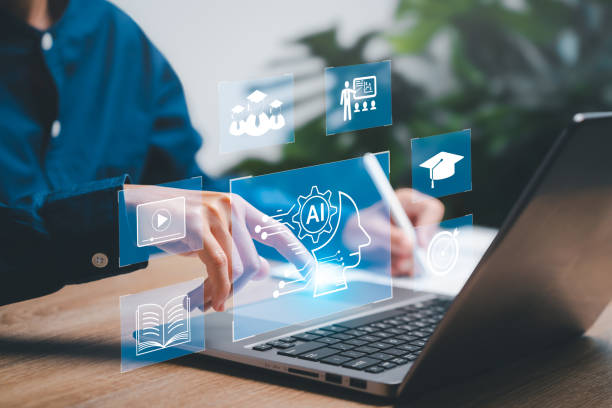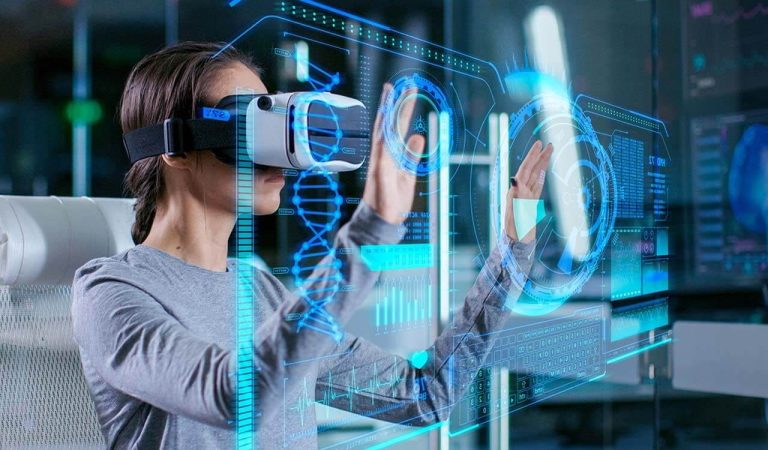
Education technology and AI Artificial Intelligence concept, Women use laptops, Learn lessons and online webinars successfully in modern digital learning, Courses to develop new skills
Artificial Intelligence (AI) is no longer just a buzzword or the subject of futuristic movies — it’s rapidly becoming a core part of our daily work lives. From automating routine tasks to transforming decision-making, AI is reshaping how businesses operate and how individuals perform their jobs.
Let’s explore the ways AI is revolutionizing the modern workplace — and what it means for the future of work.
1. Automation of Repetitive Tasks
One of the most visible impacts of AI is the automation of time-consuming, repetitive tasks. Whether it’s sorting emails, generating reports, managing calendars, or processing invoices, AI-powered tools are handling these functions more efficiently than ever.
- Customer support uses AI chatbots to respond instantly to inquiries.
- Finance teams use AI for fraud detection and faster data reconciliation.
- HR departments use AI to screen resumes and schedule interviews.
This allows employees to focus on higher-level strategic tasks instead of routine administrative work.
2. Smarter Decision Making
AI doesn’t just automate — it also augments human intelligence. With access to large datasets and predictive algorithms, AI tools help businesses make better, faster, and more informed decisions.
- Sales and marketing teams use AI for customer segmentation and personalized campaigns.
- Supply chain managers rely on AI to predict demand and manage logistics.
- Healthcare providers use AI to diagnose diseases and suggest treatments with greater accuracy.
This shift means decisions are increasingly data-driven rather than intuition-based.
3. Personalized Work Experiences
AI is also making the workplace more personalized. Tools powered by AI can learn individual work habits and adapt accordingly:
- Virtual assistants like Microsoft Copilot and Google Duet suggest edits, write drafts, and organize work.
- Learning platforms tailor professional development courses based on employee performance.
- Productivity tools like Notion AI and Grammarly provide real-time assistance to improve writing and workflow.
This personalization boosts both productivity and job satisfaction.
4. Remote Work and Collaboration
With the rise of remote and hybrid work, AI has stepped in to enhance communication and collaboration:
- AI transcription tools make meetings more accessible with real-time summaries.
- Language translation tools break down communication barriers in global teams.
- AI-powered project management tools like ClickUp and Asana help assign tasks and track progress intelligently.
These tools ensure that even distributed teams stay aligned and efficient.
5. The Changing Role of Human Workers
As AI takes over repetitive and analytical tasks, the demand for uniquely human skills is rising:
- Creativity
- Emotional intelligence
- Problem-solving
- Strategic thinking
- Adaptability
Jobs are evolving — not disappearing. While some roles may become obsolete, new ones are emerging that require managing, training, and working alongside AI.
6. Challenges and Ethical Considerations
With all its benefits, AI also brings challenges:
- Job displacement in certain sectors
- Bias in AI algorithms
- Privacy concerns related to data use
- Overdependence on machines
Businesses must address these responsibly by investing in upskilling, maintaining transparency, and applying ethical AI practices.
Final Thoughts
AI is not here to replace us — it’s here to empower us. The way we work is evolving, with humans and machines collaborating more closely than ever. To thrive in this new landscape, workers and businesses must adapt by embracing innovation, reskilling, and staying agile.
The future of work isn’t just digital — it’s intelligent.





